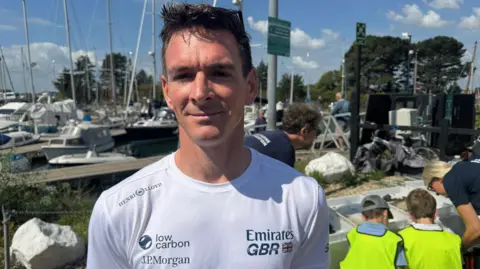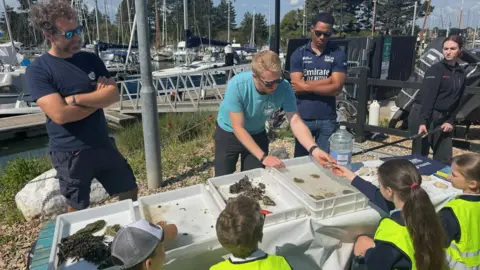Gold medallist sailor champions oyster restoration
 BBC
BBCAn Olympic gold medallist has joined conservation efforts to restore oyster populations in the Solent, as his team gears up to race on the same waters in this season's SailGP.
Dylan Fletcher, who helms Great Britain's team, said it was vital to protect the marine environment sailors share with hundreds of species that live in the strait between the Isle of Wight and Hampshire.
The global competition returns to English shores in July for the first time in three years, with GB currently second in the standings, just one point behind Australia.
"We all need to do our little bit to make the world a better place," said Fletcher.
The Olympic sailor, who won gold at Tokyo 2020 in the 49ers class, has been joined by teammates, conservationists and children from Emsworth Primary School to learn about the Solent Oyster Restoration Project.
He said: "It's incredible projects like this that are now rejuvenating the oceans and are bringing the native oysters back here into Emsworth.
"It's why we're really trying to show what is possible, that we all need to do our little bit to make the world a better place."
Fletcher said having a SailGP event in Portsmouth was "massive", adding: "We've got a grandstand that can hold 20,000 people, so I'm hoping we'll have some good conditions, showcase sailing and show how fun it is to watch.
"We're really happy with where we are at the moment. It's ultimately a long season, but we'd love to take the win in Portsmouth."
But while attention builds for the high-speed races, the Solent was once home to a different kind of activity as the site of Europe's largest oyster fishery.

Fletcher's teammate Kai Hockley said the restoration project had made a strong impression.
"I've learnt so much about how oysters help the Solent," he said. "With all the biodiversity it has, we need to make sure to protect it, to keep our Solent as good as it is."
The Blue Marine Foundation, which runs the project, said oyster numbers in the Solent have collapsed due to pollution, disease and overfishing.
The aim is to boost biodiversity and water quality but it would also help revive the Solent's former ecological and economic role.
Dr Luke Helmer, from the project, said: "We used to have Europe's largest fishery back in the 70s and 80s, with around 15 million oysters being taken, which is unfortunately now closed.
"That was about 840 tonnes a year. It was a huge industry that supported about 700 workers.
"What we're trying to do now is restore it - not only for that but for the environmental benefits, an adult oyster can filter 100 to 150 litres of water a day."
The project team is currently checking out a new four-hectare seabed reef in Chichester, which could home hundreds of thousands of oysters.
"I think it's really important that all marine users get involved in this, nobody wants to be playing or swimming in muddy waters, and oysters have an important role to play in that," said Dr Helmer.
You can follow BBC Hampshire & Isle of Wight on Facebook, X, or Instagram.
